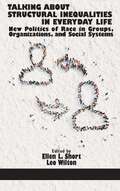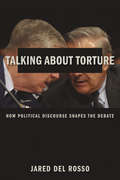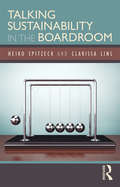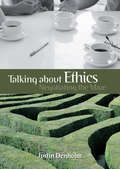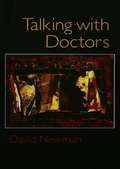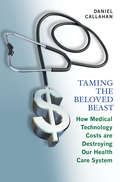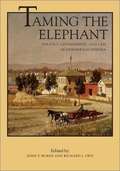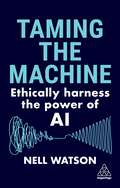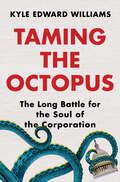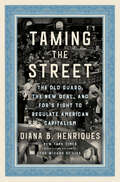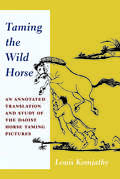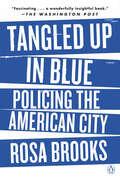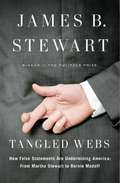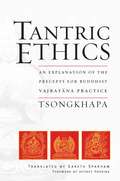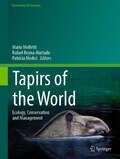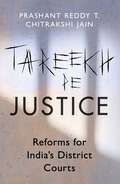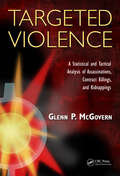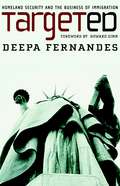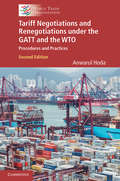- Table View
- List View
Talking About Structural Inequalities in Everyday Life: New Politics of Race in Groups, Organizations, and Social Systems
by Ellen L. Short Leo WiltonThe book, Talking About Structural Inequalities in Everyday Life: New Politics of Race in Groups, Organizations, and Social Systems, provides critical attention to contemporary, innovative, and cutting-edge issues in group, organizational, and social systems that address the complexities of racialized structural inequalities in everyday life. This book provides a comprehensive focus on systemic, societal, and organizational functioning in a variety of contexts in advancing the interdisciplinary fields of human development, psychology, counseling, social work, education, public health, multiculturalism/cultural studies, and organizational consultation. One of the most fundamental aspects of this book engages readers in the connection between theory and praxis that incorporates a critical analytic approach to learning and the practicality of knowledge. A critical emphasis examines how inequalities and power relations manifest in groups, organizations, communities, and social systems within societal contexts.
Talking About Torture: How Political Discourse Shapes the Debate
by Jared Del RossoWhen the photographs depicting torture at Iraq's Abu Ghraib prison were released in 2004, U.S. politicians attributed the incident to a few bad apples in the American military, exonerated high-ranking members of the George W. Bush administration, promoted Guantánamo as a model prison, and dismissed the illegality of the CIA's use of "enhanced interrogation." By the end of the Bush administration, members of both major congressional parties had come to denounce enhanced interrogation as torture and argue for the closing of Guantánamo. What initiated this shift? In Talking About Torture, Jared Del Rosso reviews transcripts from congressional hearings and scholarship on denial, torture, and state violence to document this wholesale change in rhetoric and attitude toward the use of torture by the CIA and the U.S. military during the War on Terror. He plots the evolution of the "torture issue" in U.S. politics and its manipulation by politicians to serve various ends. Most important, Talking About Torture integrates into the debate about torture the testimony of those who suffered under American interrogation practices and demonstrates how the conversation continues to influence current counterterrorism policies, such as the reliance on drones.
Talking Sustainability in the Boardroom
by Heiko Spitzeck Clarissa LinsA Global CEO study by Accenture and the UN Global Compact has shown that 94% of CEOs think that their board should discuss sustainability. And yet there is a real danger that boards are not living up to expectations on sustainability, paying lip-service to the concept rather than fully embedding social and environmental issues into their strategies and operations. Talking Sustainability in the Boardroom sets out why this is the case, identifies the obstacles, and then explains the opportunities for the long-term performance of the organisation that can arise through focusing on social and environmental issues. Written by two leading specialists in sustainability who have significant experience of working directly with boards, this book presents a very practical framework for embedding sustainability into board conversations and strategies. Steps include identifying and prioritising the social and environmental issues that are most pertinent to the organisation and will have the biggest impact on business, presenting the competences and skills to enable this, guidance on how to structure board meetings to ensure that these conversations truly take place, and the development of action plans and tools for measurement.
Talking about Ethics: Negotiating the Maze
by Justin DenholmTalking about Ethics is a fantastic resource for Christians keen to engage with the world around them on ethical issues. From understanding the impact of differing worldview and framework on ethical reasoning through to helpful pastoral insights into discussing ethics in an everyday or church context, the author demonstrates the value of ethics for every Christian.
Talking with Doctors
by David NewmanWithout any warning, in September 1999, David Newman was told he had a rare and life-threatening tumor in the base of his skull. In the compressed space of five weeks, he consulted with leading physicians and surgeons at four major medical centers. The doctors offered drastically differing opinions; several pronounced the tumor inoperable and voiced skepticism about the effectiveness of any nonsurgical treatment. Talking with Doctors is the story of Newman's efforts, at a time of great stress and even impending death, to wend his way through the dense thicket of medical consultations in search of a physician and a treatment that offered the possibility of survival. It is the story, especially, of the harrowing process of assessing conflicting "expert" opinions and, in so doing, of making sense of the priorities, personalities, and vulnerabilities of different doctors. All too often, he found, the leading specialists to whom he was sent were strangers in the consulting room-and strangers who became stranger still, both cognitively and emotionally, when ambiguous findings pushed them to the outer limits of their training and experience. Newman writes poignantly of his sense of powerlessness and desperation, of the painstaking means by which he ascertained what could be known about his tumor, and of the fortuitous events that finally led him to life-saving help. Talking with Doctors is a compelling, absorbing, unsettling story that touches a collective raw nerve about the experience of doctors and medical care when life-threatening illness leads us to subspecialists at major medical centers. Probing the nature of medical authority and the grounds of a trusting doctor-patient relationship, Newman illuminates with grace and power what it now means for a patient to participate in life-and-death medical decisions.
Talking with Patients and Families about Medical Error: A Guide for Education and Practice
by Robert D. Truog David M. Browning Judith A. Johnson Thomas H. GallagherMore than a million patient safety incidents occur every year, and medical error is the third leading cause of death in the United States. Illuminating the experiences of those affected by medical error—patients, their loved ones, and physicians and other medical professionals—Talking with Patients and Families about Medical Error delves deeply into the challenges of communicating honestly and openly about mistakes in medical practice.ccBased on guidelines from the Institute for Professional and Ethical Practice and the authors' own experiences, the practice-based approaches outlined here offer concrete guidance on• initiating discussions • dealing professionally and compassionately with patients' reactions • who should be included in the conversation• what information should be documented in the medical record• how to respond to questions about financial compensationAimed at promoting resolution and healing, this book stresses the importance of clear, empathetic communication that will improve clinical and organizational responses to medical missteps and mismanagement. It emphasizes five features of the physician-patient relationship deserving of special attention: transparency, respect, accountability, continuity, and kindness (TRACK). Narrative examples of common situations demonstrate how conversations about medical error can lead to healing.
Taming the Beloved Beast: How Medical Technology Costs Are Destroying Our Health Care System
by Daniel CallahanWhy health care reform must tackle the escalating cost of medical technologyTechnological innovation is deeply woven into the fabric of American culture, and is no less a basic feature of American health care. Medical technology saves lives and relieves suffering, and is enormously popular with the public, profitable for doctors, and a source of great wealth for industry. Yet its costs are rising at a dangerously unsustainable rate. The control of technology costs poses a terrible ethical and policy dilemma. How can we deny people what they may need to live and flourish? Yet is it not also harmful to let rising costs strangle our health care system, eventually harming everyone?In Taming the Beloved Beast, esteemed medical ethicist Daniel Callahan confronts this dilemma head-on. He argues that we can't escape it by organizational changes alone. Nothing less than a fundamental transformation of our thinking about health care is needed to achieve lasting and economically sustainable reform. The technology bubble, he contends, is beginning to burst.Callahan weighs the ethical arguments for and against limiting the use of medical technologies, and he argues that reining in health care costs requires us to change entrenched values about progress and technological innovation. Taming the Beloved Beast shows that the cost crisis is as great as that of the uninsured. Only a government-regulated universal health care system can offer the hope of managing technology and making it affordable for all.
Taming the Elephant: Politics, Government, and Law in Pioneer California
by John F. Burns Richard J. OrsiLively, authoritative essays on the political history of California from the Gold Rush and the achievement of statehood through the end of the 19th century. The fourth and final volume in a series of essays on California history, co-published with the California State Historical Society.
Taming the Guerrilla in International Commercial Arbitration: Levelling the Playing Field (International Law and the Global South)
by Navin G. AhujaThe book explores the definition and nature of guerrilla tactics in international commercial arbitration. It analyses various such tactics deployed (pre-Covid and during Covid times) and portrays them in a way that enables one to visualise how, and possibly why, they might be deployed. Attempts to codify ethical standards and rules regulating the behaviour of legal representatives in international arbitration are examined. The book covers a range of culture clashes, addresses several elephants in the room, and looks at factors inherent in the arbitral process that create opportunities and increase temptations to misbehave. It considers the remedies and sanctions available in international arbitration and compares them to those available to the courts in civil litigation. In addition to recommendations for future research, the book offers solutions to curb the problem in line with party autonomy and with a critical analysis. “This manuscript is an essential solutions-based text that not only addresses a comprehensive range of modern-day guerrilla tactics in international commercial arbitration but also offers thoughtful methods to deal with the shenanigans that parties may bring to the arbitral process.” - Chiann Bao, Independent Arbitrator, Arbitration Chambers and Vice President of the International Chamber of Commerce, Court of Arbitration “Dr. Ahuja’s book is a thoughtful and highly practical contribution to the study of procedures in international commercial arbitration. It is replete with scholarly analysis, careful treatment of authority, pragmatic insights and policy discussions. Any practitioner or student of international arbitration would benefit from this volume.” - Gary Born, Author, International Commercial Arbitration (3d ed. 2021) “A highly readable and informative book which identifies and analyses the numerous guerrilla tactics parties may attempt to deploy in international commercial arbitration, the factors which may encourage such behaviour, and practical mechanisms to keep the proceedings on track. Both erudite and practical, this book is a must-read for parties, counsel and arbitrators alike.” - Prof. Benjamin Hughes, Independent Arbitrator, The Arbitration Chambers “Guerrilla tactics are a pertinent problem in arbitration. Dr. Ahuja’s well written book not only describes the various tactics in a succinct way but provides extremely useful guidance on how to tackle them. It will be a primary source of reference for every practitioner faced with such tactics.” - Prof. Dr. Stefan Kröll, Chairman of the Board of Directors of the German Arbitration Institute (DIS) “Taming the Guerrilla in International Commercial Arbitration offers a refreshingly candid and balanced discussion of ‘sharp practices’ in international arbitration. The book collects a wealth of information on guerrilla tactics previously only available in separate survey reports, articles, and guidelines on the topic. It additionally includes a chapter addressing tactics deployed in virtual or remote arbitrations due to the Covid-19 pandemic. The comprehensive research and analysis presented in this book make it a valuable resource to counsel, parties, arbitrators, academics, and those who deliver practical arbitration training. A must-read for those who want to better understand the practices that may lead some to disfavor arbitration and ways the arbitration community can respond to guerrilla tactics to improve the arbitration process for all participants.”
Taming the Machine: Ethically Harness the Power of AI
by Nell WatsonAI promises to transform our world, supercharging productivity and driving new innovations. Taming the Machine uncovers how you can responsibly harness the power of AI with confidence.AI has the potential to become a personal assistant, a creative partner, an editor and a research tool all at once. But it also represents a threat to your livelihood, data and privacy. Taming the Machine offers the practical insights and knowledge you need to work with AI with an ethical and responsible approach.In this book, celebrated AI expert and ethicist Nell Watson offers practical insights on how you can ethically innovate with AI. It delves into the ethical issues of unbridled AI, highlighting the challenges that it will bring to society and business unless we fortify cybersecurity, safeguard our data, and understand the dangerous potential of artificial intelligence.Step into the future and supercharge your performance safely by Taming the Machine.
Taming the Octopus: The Long Battle for the Soul of the Corporation
by Kyle Edward WilliamsThe untold story of how efforts to hold big business accountable changed American capitalism. Recent controversies around environmental, social, and governance (ESG) investing and “woke capital” evoke an old idea: the Progressive Era vision of a socially responsible corporation. By midcentury, the notion that big business should benefit society was a consensus view. But as Kyle Edward Williams’s brilliant history, Taming the Octopus, shows, the tools forged by New Deal liberals to hold business leaders accountable, such as the Securities and Exchange Commission, narrowly focused on the financial interests of shareholders. This inadvertently laid the groundwork for a set of fringe views to become dominant: that market forces should rule every facet of society. Along the way, American capitalism itself was reshaped, stripping businesses to their profit-making core. In this vivid and surprising history, we meet activists, investors, executives, and workers who fought over a simple question: Is the role of the corporation to deliver profits to shareholders, or something more? On one side were “business statesmen” who believed corporate largess could solve social problems. On the other were libertarian intellectuals such as Milton Friedman and his oft-forgotten contemporary, Henry Manne, whose theories justified the ruthless tactics of a growing class of corporate raiders. But Williams reveals that before the “activist investor” emerged as a capitalist archetype, Civil Rights groups used a similar playbook for different ends, buying shares to change a company from within. As a rising tide of activists pushed corporations to account for societal harms from napalm to environmental pollution to inequitable hiring, a new idea emerged: that managers could maximize value for society while still turning a maximal profit. This elusive ideal, “stakeholder capitalism,” still dominates our headlines today. Williams’s necessary history equips us to reconsider democracy’s tangled relationship with capitalism.
Taming the Street: The Old Guard, the New Deal, and FDR's Fight to Regulate American Capitalism
by Diana B. HenriquesThe &“extraordinary&” (New York Times Book Review, Editors&’ Choice) story of FDR&’s fight for the soul of American capitalism—from award-winning journalist Diana B. Henriques, author of The Wizard of Lies: Bernie Madoff and the Death of Trust&“I thought I was well versed in the New Deal, but it turns out I knew next to nothing. Diana Henriques&’s chronicle is meticulous, illuminating, and riveting.&”—Kurt Andersen, New York Times bestselling author of Evil Geniuses and FantasylandTaming the Street describes how President Franklin D. Roosevelt battled to regulate Wall Street in the wake of the 1929 stock market crash and the ensuing Great Depression. With deep reporting and vivid storytelling, Diana B. Henriques takes readers back to a time when America&’s financial landscape was a jungle ruled by the titans of vast wealth, largely unrestrained by government. Roosevelt ran for office in 1932 vowing to curb that ruthless capitalism and make the world of finance safer for ordinary savers and investors. His deeply personal campaign to tame the Street is one of the great untold dramas in American history. Success in this political struggle was far from certain for FDR and his New Deal allies, who included the political dynasty builder Joseph P. Kennedy and the future Supreme Court justice William O. Douglas. Wall Street&’s old guard, led by New York Stock Exchange president Richard Whitney, fought every new rule to the &“last legal ditch.&” That clash—between two sharply different visions of financial power and federal responsibility—has shaped how &“other people&’s money&” is managed in the United States to this day. As inequality once again reaches Jazz Age levels, Henriques brings to life a time when the system worked—an idealistic moment when ordinary Americans knew what had to be done and supported leaders who could do it. A vital history and a riveting true-life thriller, Taming the Street raises an urgent and troubling question: What does capitalism owe to the common good?
Taming the Wild Horse: An Annotated Translation and Study of the Daoist Horse Taming Pictures
by Louis KomjathyIn thirteenth-century China, a Daoist monk named Gao Daokuan (1195-1277) composed a series of illustrated poems and accompanying verse commentary known as the Daoist Horse Taming Pictures. In this annotated translation and study, Louis Komjathy argues that this virtually unknown text offers unique insights into the transformative effects of Daoist contemplative practice. Taming the Wild Horse examines Gao's illustrated poems in terms of monasticism and contemplative practice, as well as the multivalent meaning of the "horse" in traditional Chinese culture and the consequences for both human and nonhuman animals.The Horse Taming Pictures consist of twelve poems, ten of which are equine-centered. They develop the metaphor of a "wild" or "untamed" horse to represent ordinary consciousness, which must be reined in and harnessed through sustained self-cultivation, especially meditation. The compositions describe stages on the Daoist contemplative path. Komjathy provides opportunities for reflection on contemplative practice in general and Daoist meditation in particular, which may lead to a transpersonal way of perceiving and being.
Tangled Up in Blue: Policing the American City
by Rosa BrooksJournalist and law professor Rosa Brooks goes beyond the "blue wall of silence" in this radical inside examination of American policingIn her forties, with two children, a spouse, a dog, a mortgage, and a full-time job as a tenured law professor at Georgetown University, Rosa Brooks decided to become a cop. A liberal academic and journalist with an enduring interest in law's troubled relationship with violence, Brooks wanted the kind of insider experience that would help her understand how police officers make sense of their world—and whether that world can be changed. In 2015, against the advice of everyone she knew, she applied to become a sworn, armed reserve police officer with the Washington, DC, Metropolitan Police Department.Then as now, police violence was constantly in the news. The Black Lives Matter movement was gaining momentum, protests wracked America's cities, and each day brought more stories of cruel, corrupt cops, police violence, and the racial disparities that mar our criminal justice system. Lines were being drawn, and people were taking sides. But as Brooks made her way through the police academy and began work as a patrol officer in the poorest, most crime-ridden neighborhoods of the nation's capital, she found a reality far more complex than the headlines suggested.In Tangled Up in Blue, Brooks recounts her experiences inside the usually closed world of policing. From street shootings and domestic violence calls to the behind-the-scenes police work during Donald Trump's 2016 presidential inauguration, Brooks presents a revelatory account of what it's like inside the "blue wall of silence." She issues an urgent call for new laws and institutions, and argues that in a nation increasingly divided by race, class, ethnicity, geography, and ideology, a truly transformative approach to policing requires us to move beyond sound bites, slogans, and stereotypes. An explosive and groundbreaking investigation, Tangled Up in Blue complicates matters rather than simplifies them, and gives pause both to those who think police can do no wrong—and those who think they can do no right.
Tangled Webs: How False Statements Are Undermining America: From Martha Stewart to Bernie Mado ff
by Stewart James B.A Tangled Web is an eclectic gather of poetry on all phases of human life, the good, the bad, and all in between.
Tantric Ethics: An Explanation of the Precepts for Buddhist Vajrayana Practice
by Jeffrey Hopkins Gareth Sparham Je TsongkhapaTantra, or Vajrayana, Buddhism is a set of esoteric practices that involve mantra recitation and complex visualizations. Tantra constitutes the fabric of a Tibetan Buddhist's daily practice, but no practice of tantra can be successful without adherence to the tantric precepts, the highest of three complementary sets of vows. Tsongkhapa is perhaps the greatest philosopher ever produced by Tibet's Buddhist culture, and this book is a translation of his explanation of the tantric precepts.
Tapirs of the World: Ecology, Conservation and Management (Fascinating Life Sciences)
by Mario Melletti Rafael Reyna-Hurtado Patrícia MediciThis beautifully illustrated book is the first comprehensive work ever published on all four tapir species worldwide, filling a gap in the scientific literature. The book provides information on the systematics, phylogeny, evolution, ecology, conservation, and management of all tapir species. This volume is aimed at a wide range of readers, including researchers, wildlife managers, zoologists, conservation biologists, ecologists, veterinarians, zoo staff, students and environmental policy makers.
Tarasoff and Beyond: Legal and Clinical Considerations in the Treatment of Life-Endangering Patients
by Leon Vandecreek Samuel KnappThis guide discusses the Tarasoff decision and subsequent related court decisions and their legal and clinical implications. This guide focuses primarily on the management of homicidal patients. In addition, the authors extend their discussion to the management of suicidal patients and child-abusing parents. To a lesser extent, other topics are discussed, including legal responsibility in dealing with AIDS parents, incompetent drivers, patent disclosures of past crimes, and therapist liability for wrongful civil commitments. Although not intended as a comprehensive treatment manual, this guide discusses clinical interventions and considerations that will minimize liability risks and, at the same time, provide quality treatment for patients.
Tareekh Pe Justice: Reforms for India's District Courts
by Prashant Reddy Thikkavarapu Chitrakshi JainOne of the biggest failures of the Indian state since it gave itself a new Constitution in 1950 has been its inability to deliver fair and timely justice to its citizens. Tareekh Pe Justice: Reforms for India&’s District Courts conducts a deep dive into the dysfunction plaguing the district judiciary. These courts are the only layer of the judiciary that operate in every district of the country. Of the three tiers of the Indian justice system, the district courts hear the largest number of cases and are the first point of contact for most Indians seeking justice. Traditionally, the debate on judicial reforms in India has been framed by the judiciary in terms of resources, be it the number of judges or funding for the judiciary. In this book, the authors attempt to reframe the issue by pointing instead to the institutional factors that have created a chilling atmosphere for the judges of the district judiciary, hampering their ability to deliver fearless, swift and decisive justice. The authors also point to a litany of problems within the higher judiciary upon whom falls the responsibility of administering the district courts. This includes a failure to publish accurate judicial statistics, an opaque decision-making process, a poorly conceptualized digitization project that has gobbled up more than Rs 2,000 crore and reckless judicial activism that has often resulted in half-baked judicial reforms. Lastly, the authors propose three big ideas to fundamentally rethink the justice system. These ideas include redesigning the constitutional architecture of the Indian judiciary, bringing back citizens into the courtrooms via juries and resisting dangerous populist demands that seek the decimation of procedural and evidentiary safeguards in the law. These are reforms that can transform the efficiency of the district courts while also restoring public trust in the Indian judiciary and the rule of law in India.
Targeted Killing
by Markus GunnefloLooking beyond the events of the second intifada and 9/11, this book reveals how targeted killing is intimately embedded in both Israeli and US statecraft, and in the problematic relationship between sovereign authority and lawful violence underpinning the modern state system. It details the legal and political issues raised in targeted killing as it has emerged in practice, including questions of domestic constitutional authority, the use of force in international law, the law of belligerent occupation, the law of targeting and human rights law. The distinctive nature of Israeli and US targeted killing is analysed in terms of the compulsion of legality characteristic of the liberal constitutional state, a compulsion that demands the ability to distinguish between legal 'targeted killing' and extra-legal 'political assassination'. The effect is a highly legalized framework for the extraterritorial killing of designated terrorists that may significantly affect the international law of force.
Targeted Sanctions
by Biersteker, Thomas J. and Eckert, Sue E. and Tourinho, Marcos Thomas J. Biersteker Sue E. Eckert Marcos TourinhoInternational sanctions have become the instrument of choice for policymakers dealing with a variety of different challenges to international peace and security. This is the first comprehensive and systematic analysis of all the targeted sanctions regimes imposed by the United Nations since the end of the Cold War. Drawing on the collaboration of more than fifty scholars and policy practitioners from across the globe (the Targeted Sanctions Consortium), the book analyzes two new databases, one qualitative and one quantitative, to assess the different purposes of UN targeted sanctions, the Security Council dynamics behind their design, the relationship of sanctions with other policy instruments, implementation challenges, diverse impacts, unintended consequences, policy effectiveness, and institutional learning within the UN. The book is organized around comparisons across cases, rather than country case studies, and introduces two analytical innovations: case episodes within country sanctions regimes and systematic differentiation among different purposes of sanctions.
Targeted Violence: A Statistical and Tactical Analysis of Assassinations, Contract Killings, and Kidnappings
by Glenn P. McGovernDrawn from case examples of incidents from around the world, Targeted Violence: A Statistical and Tactical Analysis of Assassinations, Contract Killings, and Kidnappings is the most complete resource of information on the attack methodologies, tactics used, and groups responsible for targeted killings and kidnappings. The author, a former SWAT and
Targeted: Homeland Security and the Business of Immigration
by Deepa FernandesAmerica has always portrayed itself as a country of immigrants, welcoming each year the millions seeking a new home or refuge in this land of plenty. Increasingly, instead of finding their dream, many encounter a nightmare--a country whose culture and legal system aggressively target and prosecute them. In Targeted, journalist Deepa Fernandes seamlessly weaves together history, political analysis, and first-person narratives of those caught in the grips of the increasingly Kafkaesque U.S. Homeland Security system. She documents how in post-9/11 America immigrants have come to be deemed a national security threat. Fernandes--herself an immigrant well-acquainted with U.S. immigration procedures--takes the reader on a harrowing journey inside the new American immigrant experience, a journey marked by militarized border zones, racist profiling, criminalization, detention and deportation. She argues that since 9/11, the Bush administration has been carrying out a series of systematic changes to decades-old immigration policy that constitute a roll back of immigrant rights and a boon for businesses who are helping to enforce the crackdown on immigrants, creating a growing "Immigration Industrial Complex." She also documents the bullet-to-ballot strategy of white supremacist elements that influence our new immigration legislation.
Targeting: The Challenges of Modern Warfare
by Michael N. Schmitt Paul A. L. Ducheine Frans P. B. OsingaThis book offers a multidisciplinary treatment of targeting. It is intended for use by the military, government legal advisers and academics. The book is suitable for use in both military training and educational programs and in Bachelor and Master degree level courses on such topics as War Studies and Strategic Studies. The book first explores the context of targeting, its evolution and the current targeting process and characteristics. An overview of the legal and ethical constraints on targeting as an operational process follows. It concludes by surveying contemporary issues in targeting such as the potential advent of autonomous weapon systems, 'non-kinetic' targeting, targeting in multinational military operations and leadership decapitation in counter-terrorism operations. The deep practical experience and academic background of the contributors ensures comprehensive treatment of current targeting and use of force issues. Paul Ducheine is Professor for Cyber Operations and Cyber Security, Netherlands Defence Academy, Breda, The Netherlands; and Professor of Law of Military Cyber Operations and Cyber Security at the University of Amsterdam, The Netherlands. Michael Schmitt is Charles H. Stockton Professor & Director, Stockton Center for the Study of International Law, U. S. Naval War College, Newport, Rhode Island, and Professor of Public International Law, University of Exeter, UK. Frans Osinga is Chair of the War Studies Department, Netherlands Defence Academy, Breda, The Netherlands, and Professor of Military Operational Art and Sciences.
Tariff Negotiations and Renegotiations under the GATT and the WTO: Procedures and Practices
by Anwarul HodaOver the past seven decades, since the General Agreement on Tariffs and Trade (GATT) was established in 1947, there has been a phenomenal increase in international trade in goods, largely due to sustained efforts by the world's main trading nations to reduce and eliminate tariff barriers in a multilaterally orchestrated manner. This publication reviews how the procedures and practices relating to tariff negotiations and renegotiations have evolved over this time. In particular, this new edition recounts how negotiations to expand the duty-free coverage of the Information Technology Agreement were concluded and provides an account of tariff renegotiations regarding successive enlargements of the European Union. It also covers tariff negotiations for the accession of a number of new members to the WTO, such as China and Russia. This book will be of particular interest to negotiators, members of government, trade ministries, economists and academics specialized in trade policy.
